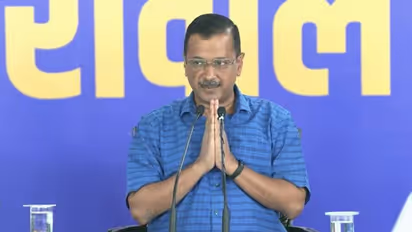'Do not stop Delhi Budget': CM Arvind Kejriwal writes to PM Modi

Synopsis
CM Kejriwal charged that the Centre was resorting to "gundagardi" and said it was the first time in the country's history that the budget of a government was put on hold. A video clip of his speech was tweeted by the Aam Aadmi Party (AAP)
Delhi Chief Minister Arvind Kejriwal on Tuesday (March 21) wrote to Prime Minister Narendra Modi requesting him to "not stop Delhi's budget", amid a row between the Centre and the AAP dispensation in the national capital over the issue.
The presentation of the Delhi government's Budget for 2023-24, which was scheduled for Tuesday, has been put on hold with the Kejriwal dispensation and the central government trading charges over allocations under various heads.
Also read: Delhi excise policy: ED asked Kavitha just 14 questions in 10 hours, claims BRS
In a letter, CM Kejriwal said, "This is the first in the last 75 years that a state's budget has been stalled. Why are you upset with Delhiites? Please don't stall Delhi's budget. With folded hands, Delhiites urge you to pass their budget."
CM Kejriwal charged that the Centre was resorting to "gundagardi" and said it was the first time in the country's history that the budget of a government was put on hold. A video clip of his speech was tweeted by the Aam Aadmi Party (AAP).
Taking to Twitter, the chief minister also shared a news report on the increase in per capita income in Delhi, and said, "Delhi is doing exceedingly well, despite all obstacles being created on daily basis. Imagine if such obstacles were not created and all govts worked together for the welfare of people. Then Delhi would grow multiple times faster."
Also Read: Tripura CM Saha is upset about his government staff not cooperating
It is reportedly said that the Ministry of Home Affairs (MHA) has stopped the budget and it will not be tabled in the Delhi Assembly on Tuesday.
As the chief minister lashed out at the Centre, sources in the MHA said the ministry has sought clarification from the AAP government as its budget proposal had high allocation for advertisement and relatively low funding for infrastructure and other development initiatives.
(With inputs from PTI)
Stay updated with the Breaking News Today and Latest News from across India and around the world. Get real-time updates, in-depth analysis, and comprehensive coverage of India News, World News, Indian Defence News, Kerala News, and Karnataka News. From politics to current affairs, follow every major story as it unfolds. Get real-time updates from IMD on major cities weather forecasts, including Rain alerts, Cyclone warnings, and temperature trends. Download the Asianet News Official App from the Android Play Store and iPhone App Store for accurate and timely news updates anytime, anywhere.